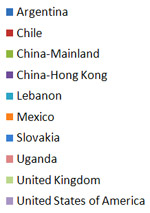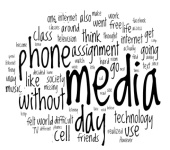
The Bar chart (above) expresses how often students reported that they were 'addicted' to media. Click on it to go to a full graphic.
HIGHLIGHTS
- ‘Addiction’ is a rhetorically powerful word: Students around the world repeatedly used the term ‘addiction’ to speak about their dependence on media. They supported that word choice with telling analogies and metaphors that made explicit the depths of their distress. Click here to see a poster of student responses, by country, to going ‘Unplugged.’
(Click for further details.)
- ‘Addiction’ is a physical need: Students across the dozen participating universities reported an unexpected phenomenon: they not only missed the ‘functions’ of the media – the delivery of news and information – but they physically craved the actual devices themselves.
(Click for further details.)
- Students reported emotional symptoms of their ‘addiction’ to media: Students from every country wrote about how going 24 hours without media affected their emotional well-being. Even some of those who found benefits in unplugging – fewer distractions, face-to-face connections with friends and family – likened their reactions to the media fast to feelings of a drug withdrawal. They became anxious, stressed, jealous, hostile.
(Click for further details.)
“I cannot. I feel empty. I feel isolated.” — Argentina
Students’ ‘addiction’ to media may not be clinically diagnosed, but it sure seems real: Students from around the world spoke about their ‘addiction’ and ‘dependence’ on media – and backed up that rhetoric by citing related feelings. So students based in China mentioned that they felt ‘lonely,’ ‘anxious,’ ‘fretful,’ ‘extremely upset,’ and even ‘crazy.’ Students in Slovakia spoke about being ‘nervous,’ and noted their feelings of ‘emptiness.’ Students based in the UK said they were ‘fidgety,’ ‘restless,’ and that they had to fight down their ‘urges to connect‘ and their ‘panic.’ Students in USA universities noted that they felt ‘stressed‘ and ‘paranoid,’ and had even adopted such physical twitches as ‘twiddling‘ their thumbs. Students from Mexico reported that they felt ‘sad‘ and ‘desperate.’
- Slovakia: “I was literally staring at the wall, because from my point of view, that’s almost the only thing you can do nowadays without a PC, TV or cell phone.”
- Mexico: “I was so desperate that suddenly I realized I was making weird sounds with my mouth and I had not noticed what time I had begun to do that or how long I had been doing.”
- China: “As matter of fact, I’m quite addicted to the computer and the internet. In the wake of this experiment, I realized that media is spread like a web that binds me. Perhaps before I became aware of it, its threads took root in my muscles, blood, nerves and everywhere.”
“Media is my drug; without it I was lost…. I am an addict. I don’t need alcohol, cocaine or any other derailing form of social depravity; I just need my drug. I had this somewhat hideous realization at about 7pm on Sunday, 24th October. I paced, I pondered the meaning of life and then I panicked. How could I survive 24 hours without it? How could I go on?” — UK
Again and again, students compared their media ‘dependency’ to other more documented addictions. A student based in Slovakia observed, for example, “Until this day I thought I am addicted to only three things: money, sex and chewing of chewing gums, but after my today’s experience I found out that there’s another addiction: an addiction to media.” And three students based in the UK compared their media use to a smoking habit, to abuse of alcohol, and to an eating disorder:
- UK: “The only feeling I can relate to giving up my phone and Twitter is that of giving up smoking. When I gave up smoking and I saw others smoking, I felt as though I was missing out on something. During the 24 hours of the experience I actually craved having my phone, and routinely checked my pockets for it every 5 minutes.
- UK: “My experience taught me of the dangers of my addiction to media. The struggle I had, especially in the first few hours when I was on my own, could be described in the same terms as an addiction to alcohol. If I’m considered to be a typical media consumer, then it shows how media shapes our society consistently. Even actions such as eating breakfast had been shaped to such an extent that I was almost distressed when I couldn’t read the news.
- UK: “It’s like some kind of disorder, an addiction. I became bulimic with my media; I starved myself for a full 15 hours and then had a full on binge. Emails, texts, BBC iPlayer, 4oD, Facebook… I felt like there was no turning back now, it was pointless. I am addicted, I know it, I am not ashamed.
The need for media is tangible: Students’ repeatedly called the level of their (and their friends’) dependence on media ‘scary.’ Said one student based in China: “This is very scary. We are too dependent on it,” while a student from a U.S. university noted “After experiencing this dreadful 24-hours, I realized that our obsession with media is almost scary. I could not even begin to imagine the world if it was media-free.” And students around the world noted the unsettling realization that they had an almost irresistible urge to touch the devices that had been declared off-limits for 24 hours.
- China: “As time went by, my loneliness and helplessness spread, and the anxiety and desire of touching media became stronger.”
- Slovakia:“That day I was very nervous, because I usually use my mobile as a ‘touch think.’ It means I take out my cell phone every minute and I look at the display, but I usually don’t want to know the time or anything.”
- Mexico: “Regarding the psychological effect, I think there was an effect concerning the cell phone. Although it was turned off, I kept it charged, and I thought it was funny because I never realized that psychologically this is a part of me… I could not leave it.“
- USA: “I constantly felt tempted to reach for something I could turn on.”
- Lebanon: “It was not the television that I needed, since I don’t watch much television anyway, it was not the internet that I wanted either or to make phone calls, but it was more about a means of practice that I was so used to. I was used to having the television on even if I was not watching the television, my Facebook was always on even if I was not at my laptop, and my phone was always in my hand even if I didn’t use it.
“I realized that I was having hostile thoughts towards those students who were walking around texting. I was jealous of them and it literally felt like some sort of withdrawal.” — USA
I knew I was addicted when… Students often began their narrative of their day without media by admitting as a matter of fact to their dependency on media – especially their mobile phones. They then followed by documenting when they realized exactly how dependent on media they actually were, and by recording the symptoms of their ‘addiction’ to media.
- Uganda: “It will not do any good if I do not begin on the note of acknowledging that I am actually very tied to the media.”
- Argentina: “I realized that out of every 24 hours, I’m connected to a machine 15 hours a day.”
- USA: “I was itching, like a crackhead, because I could not use my phone.”
- UK: “Itching to be attached, desperate to feel part of something bigger than myself. My senses numbed. I feel paralyzed, almost handicapped in my ability to live.”
- Mexico: “It was quite late and the only thing going through my mind was: (voice of psychopath) ‘I want Facebook.’ ‘I want Twitter.’ ‘I want YouTube.’ ‘I want TV.’“
- UK: “As soon as my 24 hours were up, I grabbed my beloved Blackberry and turned on my laptop. I felt almost like a drug addict getting a fix after a long stint of going cold turkey.”
- Slovakia: “If you are alone, without any media you do not know what to do. Your only chance is to go out with friends, but you had to make a plan beforehand, because you cannot use a cell phone. And every pub, tearoom or restaurant is playing music. So your only one possibility is go to bed early and look forward to the next day, with media. Like I did.”
NB: The researchers of this Unplugged study are not health care professionals trained in the diagnosis and characteristics of addictions or depressions, and this study was not intended to assess students’ mental or physical well-being. The researchers do note, however, that many students employed the rhetoric of addiction, dependency and depression when self-reporting their reactions to going unplugged for 24 hours, and that many students also reported both mental and physical symptoms of distress.
ad·dic·tion– noun \ə-ˈdik-shən, a-\ Addiction is defined as “the compulsive need for and use of a habit-forming substance (as heroin, nicotine or alcohol) characterized by tolerance and by well-defined physiological symptoms upon withdrawal.”
Quotes on this page may have been edited to regularize spelling and grammar.








Pingback: Studenter lider av internetberoende | nyheternadirekt